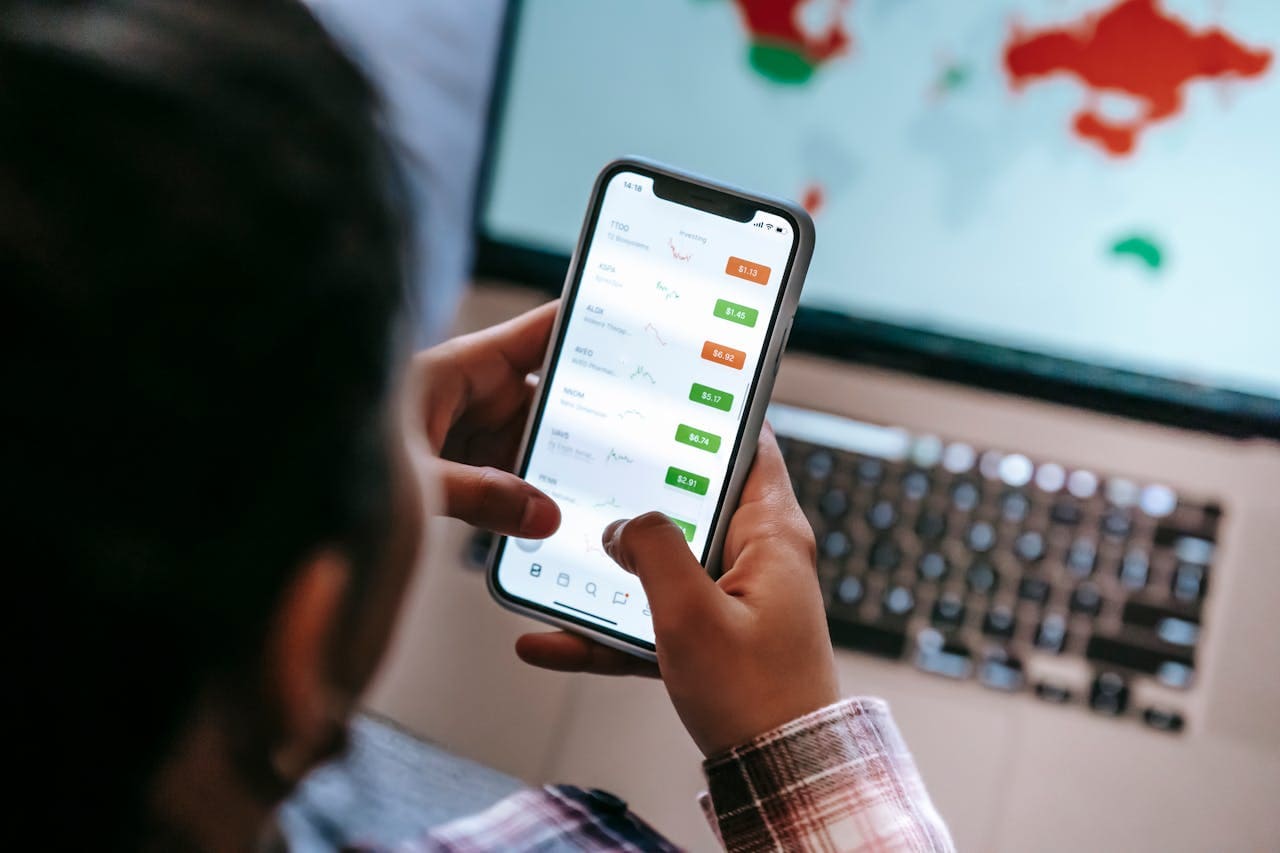The Ultimate Guide to Financial Planning for Freelancers

Table of Contents
Introduction
As a freelancer, you deliver high-quality work to your clients and manage your finances. Financial planning is crucial for freelancers to ensure a stable and secure future in an often unpredictable industry. Freelancers face unique challenges when budgeting, saving, and investing without a regular paycheck or employer-sponsored benefits.
In this comprehensive guide, we will dive deep into the world of financial planning for freelancers. We’ll cover everything from understanding your income and creating a budget to separating your business and private finances, tax planning, retirement savings, and more. By the end of this article, you’ll have a solid foundation for taking control of your finances and achieving your short-term and long-term financial targets as self-employed.
Understanding Your Freelance Income
The first step in financial planning for freelancers is to gain a clear understanding of your income. As a freelancer, your income may fluctuate from month to month, making it more challenging to create a stable budget. To get started, consider the following:
Determining your hourly rate or project fees
To set your hourly rate or project fees, research the market rates for your industry and skill level. Consider factors such as your experience, education, and the value you provide to your clients. Don’t be afraid to negotiate your rates based on the scope of the project and your expertise.
Estimating your monthly and annual income
Once you have established your hourly rate or project fees, estimate your monthly and annual income. Look at your past earnings and current client contracts to create a realistic projection. Remember to account for potential dry spells or slow periods in your business.
Accounting for fluctuations in income
Freelance income can be unpredictable, so planning for fluctuations is essential. Consider setting aside a portion of your income during high-earning months to cover expenses during slower periods. A good rule of thumb is to save at least 10-20% of your income for emergencies and unexpected expenses.
Diversifying your income streams
To mitigate the risk of income fluctuations, consider diversifying your income streams. That may include offering additional services, partnering with freelancers, or creating passive income sources such as online courses or digital products.
By understanding your freelance income, you can create a more accurate budget and make informed financial decisions for your business and private life.
Creating a Budget
Creating a budget is essential for managing your finances as a freelancer. A well-designed budget will help you track your income and expenses, set financial targets, and make informed decisions about your money. Here’s how to get started:
Assessing your monthly expenses
Start by listing your monthly expenses, including business and private expenses. That may include rent, utilities, groceries, insurance, business supplies, and software subscriptions. Be sure to account for variable costs, such as marketing or travel expenses, that may change monthly.
Categorizing your expenses (business vs. personal)
Separate your expenses into business and personal categories. That will help you track your business spending for tax purposes and ensure you spend appropriately in both areas. Consider using a spreadsheet or app of expenditures to make this process easier.
Setting financial goals
Set clear financial targets for your freelance business and personal life. That may include saving for a down payment on a house, paying off debt, or investing in your industry. Be specific and realistic when setting your goals, and break them down into smaller, achievable milestones.
Allocating funds for taxes, savings, and investments
As a freelancer, setting aside money for taxes, savings, and investments is essential. A good rule of thumb is to allocate 25-30% of your income for taxes, 10-20% for savings, and 10-15% for investments. Adjust these percentages based on your specific financial situation and goals.
Adjusting your budget based on income fluctuations
Your freelance income may fluctuate monthly, so it’s essential to be flexible with your spending. During high-earning months, allocate extra funds to your savings and investment accounts. During slower months, focus on covering your essential expenses and adjusting your discretionary spending as needed.
By creating a comprehensive spending plan and regularly reviewing and adjusting it, you can take control of your finances and make informed decisions about your money as a freelancer.
Managing Cash Flow

Managing cash flow is crucial for freelancers to have enough money to cover their expenses and invest in their business. Here are some strategies for managing your cash flow effectively:
Invoicing clients and setting payment terms
Set definitive payment terms with your clients and promptly issue service invoices. Ponder provides incentives for prompt payment, like a modest discount, to motivate clients to settle their dues punctually. Ensure consistent and professional follow-up procedures for late payments.
Following up on late payments
Late payments can significantly impact your money flow as a freelancer. Develop a system for following up on late payments, such as sending reminder emails or making phone calls. Consider whether an ad needs to arrive on time terms or find new clients if a client is consistently late with payments.
Using accounting software to track income and expenses
Investing in accounting software can help you track your income and expenses more efficiently. Popular options for freelancers include QuickBooks, FreshBooks, and Wave. These tools can help you create invoices, track payments, and generate financial reports.
Creating an emergency fund
A freelancer must have an emergency fund to cover unexpected expenses or income gaps. Aim to save at least three to six months’ living expenses in a separate savings account. That will provide a financial cushion and help you avoid debt during tough times.
Dealing with dry spells or slow periods
Freelancing can be unpredictable, and dry spells or slow periods are common. To manage money flow during these times, consider offering discounts or promotions to attract new clients, diversifying your income streams, or temporarily reducing your expenses. An emergency fund can also help you weather these periods without financial stress.
By implementing these money flow management strategies, you can ensure that your freelance business remains financially stable and that you have the resources to invest in your growth and success.
Separating Business and Private Finances
One of freelancers’ most important aspects of financial planning is separating your business and private finances. That helps you stay organized and track your expenses more efficiently, simplifies your tax preparation, and protects your assets. Here’s how to separate your finances:
Opening a separate business bank account
Open a separate bank account for your freelance business. That will help you keep your business income and expenses separate from your finances. Look for a bank that offers low fees and good online banking options for small businesses.
Getting a business credit card
Consider getting a business credit card to use for your business spending. That will help you track your expenses more efficiently and provide valuable rewards or cashback on your purchases. Be sure to pay off your balance in full each month to avoid interest charges.
Keeping accurate records of business expenses
Keep detailed records of all your business expenses, including receipts and invoices. That will help you track your expenses more efficiently and ensure you’re claiming all eligible tax deductions. Consider using a digital receipt tracking app or software to simplify this process.
Paying yourself a salary
As a freelancer, paying yourself a regular salary from your business income is essential. That will help you plan your expenses more effectively and ensure you set aside enough money for taxes and savings. Determine a reasonable salary based on your business income and expenses, and transfer this amount to your personal bank account each month.
By separating your business and private finances, you can create a more organized and efficient financial system for your freelance business. That will save you time and stress in the long run and help you make more informed decisions about your money.
Tax Planning for Freelancers
Tax planning is an essential aspect of freelancers’ financial planning. As a self-employed individual, you are responsible for paying your taxes and may have additional tax obligations compared to traditional employees. Here’s what you need to know about tax planning as a freelancer:
Understanding your tax obligations as a self-employed individual
As a freelancer, you must pay self-employment tax and income tax. Self-employment tax includes Social Security and Medicare taxes, typically withheld from traditional employees’ paychecks. You must also pay estimated taxes quarterly to avoid penalties and interest charges.
Estimating and setting aside money for quarterly tax payments
To avoid a large tax bill at the end of the year, estimate your tax liability and make quarterly tax payments. A good rule of thumb is to set aside 25-30% of your income for taxes. Use Form 1040-ES to calculate and pay your estimated taxes each quarter.
Knowing what expenses are tax-deductible
As a freelancer, you can deduct many business expenses from your taxes. That may include home office expenses, equipment and supplies, marketing and advertising, and travel expenses. Keep accurate records of all your business spending throughout the year to maximize your deductions.
Hiring a tax professional or using tax preparation software
Considering the complexity of tax planning for freelancers, hiring a tax professional or using tax preparation software may be beneficial. A tax professional can help you navigate the tax code, identify deductions, and ensure you comply with all tax laws. Tax preparation software, such as TurboTax or H&R Block, can simplify the process and help you maximize your deductions.
Staying organized with receipts and financial documents
Stay organized throughout the year to make tax preparation more accessible and ensure that you keep receipts and financial documents in a secure and easily accessible place, such as a digital cloud storage system or physical filing cabinet.
By understanding your tax obligations, setting aside money for taxes, and staying organized, you can minimize your tax liability and avoid costly mistakes as a freelancer. Consult a tax professional with any questions or concerns about your tax situation.
Saving for Retirement

Saving for retirement is an essential aspect of financial planning for freelancers. Without an employer-sponsored retirement plan, freelancers are responsible for creating and funding their retirement savings. Here’s what you need to know about saving for retirement as a freelancer:
Understanding retirement options for freelancers (e.g., SEP IRA, Solo 401(k))
Several retirement savings options are available for freelancers, including Simplified Employee Pension Individual Retirement Accounts (SEP IRAs) and Solo 401(k) plans. A SEP IRA allows you to contribute up to 25% of your net self-employment income, up to a maximum of $58,000 annually (as of 2021). A Solo 401(k) plan allows you to contribute both as an employer and employee, with a total contribution limit of $58,000 per year (as of 2021).
Determining how much to plan for retirement
To determine how much you should plan for retirement, consider your current age, desired retirement age, and estimated retirement expenses. A general rule of thumb is to save at least 10-15% of your income for retirement, but you may need to save more depending on your specific goals and circumstances. Use a retirement calculator or consult a financial advisor to create a personalized retirement savings plan.
Automating retirement contributions
Consider automating your contributions to ensure that you’re consistently planning for retirement. Set up automatic transfers from your business bank account to your retirement account each month or quarter. That will help you prioritize your retirement savings and avoid the temptation to spend the money elsewhere.
Considering a Roth IRA for tax-free withdrawals in retirement
In addition to a SEP IRA or Solo 401(k), consider opening a Roth IRA. With a Roth IRA, you contribute after-tax dollars, but your contributions and earnings grow tax-free. That can provide a valuable source of tax-free income in retirement. As of 2021, you can contribute up to $6,000 per year (or $7,000 if you’re 50 or older) to a Roth IRA, depending on your income level.
By understanding your retirement savings options, determining how much to save, and automating your contributions, you can create a secure financial future as a freelancer. Review and adjust your retirement savings plan regularly to ensure you’re on track to meet your goals.
Insurance for Freelancers
Protecting yourself and your business with the right insurance coverage is essential as a freelancer. Without employer-sponsored benefits, freelancers are responsible for obtaining their insurance policies. Here are some crucial types of insurance to consider:
Health insurance options (e.g., individual plans, healthcare sharing ministries)
Health insurance is essential for freelancers to protect against unexpected medical expenses. Options for freelancers include individual health insurance plans, which can be purchased through the Health Insurance Marketplace or directly from insurance companies. Another option is healthcare-sharing ministries, faith-based organizations that share medical expenses among members.
Disability insurance to protect your income
Disability insurance provides a portion of your income if you cannot work due to an illness or injury. As a freelancer, your income depends on your ability to work so that disability insurance can provide valuable financial protection. Look for a policy that covers both short-term and long-term disabilities.
Liability insurance for your business
Liability insurance protects your business against claims of negligence, errors, or omissions. This type of insurance can cover legal fees, settlements, and judgments if a client or third party sues your business. The specific type of liability insurance you need may depend on your industry and the services you provide.
Life insurance to provide for dependents
Life insurance provides financial protection for your dependents during your death. As a freelancer, life insurance can help ensure your family is financially secure if something happens to you. Consider a term life insurance policy, which provides coverage for a specific period, such as 10, 20, or 30 years.
When choosing insurance policies, shop around and compare quotes from multiple providers. Consider working with an insurance broker specializing in coverage for freelancers and small businesses. They can help you identify the right policies for your needs and spending.
By obtaining the right insurance coverage, you can protect yourself, your business, and your family from financial hardship and uncertainty as a freelancer.
Investing for the Future
Investing is an essential aspect of financial planning for freelancers, as it can help you grow your wealth over time and achieve your long-term financial targets. Here’s what you need to know about investing as a freelancer:
Setting investment goals
Before you start investing, it’s essential to set clear investment goals. That may include saving for a down payment on a house, funding your children’s education, or building a retirement nest egg. Be specific and realistic when setting your goals, and consider your timeline for achieving them.
Understanding investment options (e.g., stocks, bonds, mutual funds)

Many investment options include stocks, bonds, and mutual funds. Stocks represent ownership in a company and can provide the potential for capital appreciation and income through dividends. Bonds are debt securities that provide a fixed rate of return over a specific period. Mutual funds are professionally managed portfolios that invest in various stocks, bonds, or other securities.
Considering robo-advisors or online investment platforms
For freelancers new to investing or needing more time to manage their investments, robo-advisors or online investment platforms can be a good option. These services use algorithms to create and manage a personalized investment portfolio based on your goals, risk tolerance, and timeline. Popular choices include Betterment, Wealthfront, and Vanguard Digital Advisor.
Diversifying your investment portfolio
Diversification is critical to managing risk in your investment portfolio. That means investing in various asset classes, such as stocks, bonds, and real estate, as well as different sectors and geographic regions. By diversifying your portfolio, you can minimize the impact of any one investment or market event on your overall returns.
We are regularly reviewing and adjusting your investments.
It’s essential to regularly review and adjust your investments to ensure that they remain aligned with your goals and risk tolerance. That may involve rebalancing your portfolio periodically to maintain your desired asset allocation or making changes based on market conditions or life events. Consider working with a financial advisor or using online tools to help you monitor and manage your investments.
By setting clear investment goals, understanding your options, diversifying your portfolio, and regularly reviewing and adjusting your investments, you can create a solid foundation for long-term financial success as a freelancer.
Working with Financial Professionals
As a freelancer, working with finance experts can help you navigate the complexities of financial planning and make informed decisions about your money. Here’s what you need to know about working with finance experts:
When to consider hiring a financial planner or advisor
Consider hiring a financial planner or advisor if you have complex financial needs, such as managing a high income, navigating significant debt, or planning a major life event like retirement or buying a home. A finance expert can help you create a comprehensive financial plan, optimize your investments, and make informed decisions about your money.
How to find a qualified financial professional
Ask for referrals from friends, family, or colleagues to find a qualified finance expert. You can also search online directories, such as the Financial Planning Association or the National Association of Personal Financial Advisors. Look for professionals with relevant certifications, such as Certified Financial Planner (CFP) or Chartered Financial Analyst (CFA), and with experience working with freelancers or small business owners.
Preparing for meetings with your financial advisor
To get the most out of your meetings with a financial advisor:
- Come prepared with relevant financial documents, such as tax returns, bank statements, and investment account statements.
- Be ready to discuss your financial goals, risk tolerance, and any concerns or questions about your finances.
- Consider creating a list of topics or questions you want to cover in the meeting.
Implementing and monitoring your financial plan
Once you have created a financial plan with your financial advisor, it’s essential to implement the plan and monitor your progress regularly. That may involve changing your spending, adjusting your investments, or updating your insurance coverage. Schedule regular check-ins with your financial advisor to review your progress and make any necessary adjustments to your plan.
Working with finance experts can provide valuable guidance and support as you navigate the unique financial challenges of freelancing. By finding a qualified professional, preparing for meetings, and implementing and monitoring your financial plan, you can make informed decisions about your money and achieve your long-term financial goals.
Financial Tools and Resources for Freelancers
Many financial tools and resources are available to help freelancers manage their money more effectively. Here are some popular options to consider:
Spending on apps and software
Spending apps and software can help you track your income and expenses, set financial targets, and create a spending plan. Popular freelancer options include Mint, YNAB (You Need a Budget), and PocketGuard. These tools can sync with your bank accounts and credit cards to provide real-time updates on your spending and help you stay on track.
Invoicing and accounting tools
Invoicing and accounting tools can help you streamline billing, track payments, and manage your business finances. Popular options for freelancers include FreshBooks, QuickBooks Self-Employed, and Wave. These tools can help you create professional invoices, track expenses, and generate financial reports for tax purposes.
Tax preparation software
Tax preparation software can help you navigate the complexities of filing taxes as a freelancer. Popular options include TurboTax Self-Employed, H&R Block Self-Employed, and TaxAct Freelancer. These tools can guide you through reporting your income and expenses, maximizing your deductions, and filing your taxes accurately and on time.
Investment platforms and robo-advisors
Investment platforms and robo-advisors can help you start investing and growing your wealth as a freelancer. Popular options include Betterment, Wealthfront, and Acorns. These tools can help you create a diversified investment portfolio based on your goals and risk tolerance and provide automated investing and portfolio management services.
Financial education websites and blogs
Many websites and blogs are dedicated to providing financial education and advice for freelancers. Some popular options include;
- Freelancers Union
- The Freelancer’s Union Blog
- The Freelance to Freedom Project
These resources can provide valuable tips for freelancers and strategies for managing their finances, growing their businesses, and achieving their financial targets as freelancers.
By taking advantage of these financial tools and resources, you can streamline your financial management, make informed decisions about your money, and achieve tremendous economic success as a freelancer.
Conclusion
Financial planning is essential for freelancers to achieve economic stability and long-term success. By understanding your income, creating a financial estimate, managing your money flow, separating your business and private finances, planning for taxes, planning for retirement, obtaining insurance coverage, investing for the future, and working with financial experts, you can take control of your finances and build a strong foundation for your freelance business and private life.
Remember, financial planning is an ongoing process that requires regular review and adjustment. By staying organized, setting clear goals, and seeking guidance when needed, you can confidently navigate the unique financial challenges of freelancing and achieve your desired level of economic security and freedom.
As you implement these financial planning strategies, consult with qualified professionals, such as tax advisors, financial advisors, and insurance agents, to ensure you make informed decisions based on your specific needs and circumstances. With the right tools, resources, and support, you can create a bright financial future for yourself and your freelance business.



